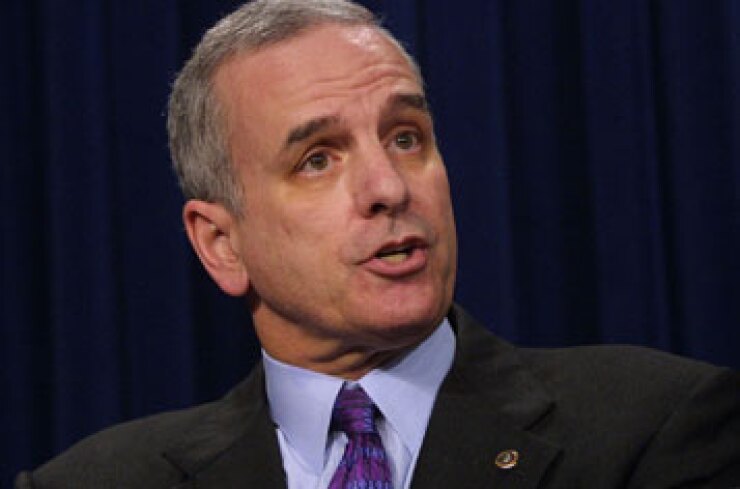
CHICAGO — Minnesota lawmakers should use the state's budget surplus for education and other services and approve new borrowing for transportation and infrastructure to make a lasting imprint on the state's landscape, Gov. Mark Dayton urged in his State of the State address.
Dayton, a member of the state's Democrat-Farmer-Labor Party, wants to tap a good chunk of the nearly $2 billion surplus for education related spending in the next operating budget. He previously announced a 10-year, $11 billion transportation funding package that relies on higher taxes and fees and recently proposed an $842 million bond-financed capital program to pay for projects across the state.
Some lawmakers believe the capital budget should wait until next year as they typically tackle a capital program, referred to as the bonding bill, in the year after adopting a two-year operating budget. The budget is before lawmakers this year. Republicans, who control the House, also want new spending on transportation to fix roads and bridges and improve transit but prefer to tap the surplus instead of raising taxes.
"It is tempting to allocate a significant amount of the current surplus to fund transportation projects," Dayton said in the address he delivered Thursday evening. "Reallocating general fund dollars to pay for essential transportation improvements will inevitably pit those needs against educating our children" caring for the state's elderly, improving natural resources and healthcare.
"People should not be pitted against projects. Both are too important," he said.
On his bonding bill, Dayton said the state can't afford to wait. "That just doesn't make sense. Interest rates remain low; we have capacity for the debt service within existing guidelines; and many of those and other improvements are urgently needed," he said.
Dayton used his speech to defend a prior income tax hike on the state's top income bracket, dismissing Republican assertions that the current surplus means the state's tax rates are too high and the surplus should be returned to taxpayers.
"Let me repeat — It is Minnesota's economic successes, not tax increases, that have produced our present budget surplus," Dayton said, arguing the state's low unemployment is what's fueled the surplus.
The proposed capital budget relies on a mix of state general obligation bond issuance, appropriation-backed borrowing, and Minnesota Housing Finance Agency bonding. Dayton estimated the package would create 23,900 jobs.
Dayton's transportation plan relies on higher revenue from a 6.5% gross receipts tax on gasoline, raising the current 1.25% base tax on vehicle registration fees to 1.5%, and raising car registration fees by $10 to pay for projects and repay proposed borrowing. Another $2.8 billion would be generated to fund Twin Cities transit projects from a half cent sales tax increase in the region and another $120 million would come from the general fund to support transit projects statewide.
The state's latest revenue estimate in early March added another $800 million to a projected surplus, more than doubling the extra revenue expected in the current biennial. Dayton earlier this year proposed a $42 billion, two-year operating budget that would use $1 billion of the surplus to increase education spending.
Ahead of Minnesota's last new money sale in the summer, Fitch Ratings affirmed the state's AA-plus rating, Moody's Investors Service affirmed its Aa1 rating, and Standard & Poor's affirmed its AA-plus rating. All assign a stable outlook. The ratings affect $6 billion of GO debt.





